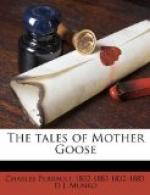“I have, moreover, been informed,” said the Cat, “but I know not how to believe it, that; you have also the power to take on you the shape of the smallest animals; for example, to change yourself into a rat or a mouse, but I must own to you I take this to be impossible.”
“Impossible!” cried the Ogre; “you shall see.” And at the same time he changed himself into a mouse, and began to run about the floor. Puss no sooner perceived this than he fell upon him and ate him up.
Meanwhile, the King, who saw, as he passed, this fine castle of the Ogre’s, had a mind to go into it. Puss, who heard the noise of his Majesty’s coach coming over the drawbridge, ran out, and said to the King, “Your Majesty is welcome to this castle of my Lord Marquis of Carabas.”
“What! my Lord Marquis,” cried the King, “and does this castle also belong to you? There can be nothing finer than this courtyard and all the stately buildings which surround it; let us see the interior, if you please.”
The Marquis gave his hand to the young Princess, and followed the King, who went first. They passed into the great hall, where they found a magnificent collation, which the Ogre had prepared for his friends, who were that very day to visit him, but dared not to enter, knowing the King was there. His Majesty, charmed with the good qualities of my Lord of Carabas, as was also his daughter, who had fallen violently in love with him, and seeing the vast estate he possessed, said to him:—
“It will be owing to yourself only, my Lord Marquis, if you are not my son-in-law.”
The Marquis, with low bows, accepted the honor which his Majesty conferred upon him, and forthwith that very same day married the Princess.
Puss became a great lord, and never ran after mice any more except for his diversion.
RIQUET WITH THE TUFT.
Once upon a time there was a Queen who had a son so ugly and so misshapen that it was long disputed whether he had human form. A fairy who was at his birth said, however, that he would be very amiable for all that, since he would have uncommon good sense. She even added that it would be in his power, by virtue of a gift she had just then given him, to bestow as much sense as he pleased on the person he loved the best. All this somewhat comforted the poor Queen. It is true that this child no sooner began to talk than he said a thousand pretty things, and in all his actions there was an intelligence that was quite charming. I forgot to tell you that he was born with a little tuft of hair upon his head, which made them call him Riquet[1] with the Tuft, for Riquet was the family name.
[Footnote 1: R[=e]k[=a].]
Seven or eight years later the Queen of a neighboring kingdom had two daughters who were twins. The first born of these was more beautiful than the day; whereat the Queen was so very glad that those present were afraid that her excess of joy would do her harm. The same fairy who was present at the birth of little Riquet with the Tuft was here also, and, to moderate the Queen’s gladness, she declared that this little Princess should have no sense at all, but should be as stupid as she was pretty. This mortified the Queen extremely; but afterward she had a far greater sorrow, for the second daughter proved to be very ugly.




